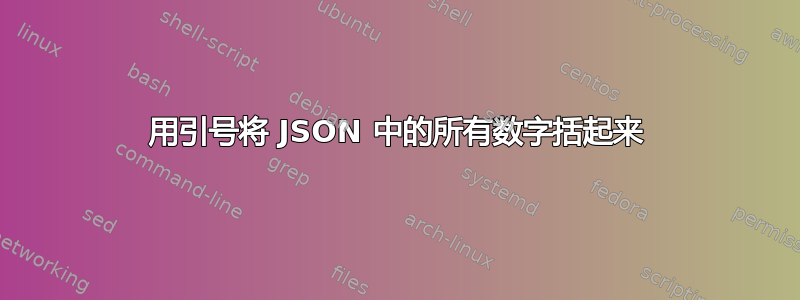
有一些 JSON 数据包含一些数值。如何将所有数字转换为字符串? (用引号括起来)
例子:
{
"id":1,
"customer":"user",
"plate":"BMT-216-A",
"country":"GB",
"amount":1000,
"pndNumber":20000,
"zoneNumber":4
}
应该成为
{
"id":"1",
"customer":"user",
"plate":"BMT-216-A",
"country":"GB",
"amount":"1000",
"pndNumber":"20000",
"zoneNumber":"4"
}
答案1
$ jq 'map_values(tostring)' file.json
{
"id": "1",
"customer": "user",
"plate": "BMT-216-A",
"country": "GB",
"amount": "1000",
"pndNumber": "20000",
"zoneNumber": "4"
}
重定向到新文件,然后将其移至原始文件名。
为了更彻底地将非平面结构中的数字转换为字符串,请考虑
jq '(..|select(type == "number")) |= tostring' file.json
这将递归地检查给定文档中的每个值,并选择数字。然后将选定的值转换为字符串。严格来说,它还会查看键,但由于这些不能是 JSON 中的纯数字,因此不会选择任何键。
例子:
$ jq . file.json
{
"a": {
"b": 1
},
"b": null,
"c": [
1,
2,
"hello",
4
]
}
$ jq '(..|select(type == "number")) |= tostring' file.json
{
"a": {
"b": "1"
},
"b": null,
"c": [
"1",
"2",
"hello",
"4"
]
}
要另外引用null,请将 更改select()为
select(type == "number" or type == "null")
答案2
这是一个基于的简单解决方案jtcUNIX实用程序:
bash $ jtc -w'<.*>D:' -eu echo '"{}"' \; file.json
{
"amount": "1000",
"country": "GB",
"customer": "user",
"id": "1",
"plate": "BMT-216-A",
"pndNumber": "20000",
"zoneNumber": "4"
}
bash $
如果您想将更改直接应用到 json 文件中,请使用开关-f,如下所示:
bash $ jtc -f -w'<.*>D:' -eu echo '"{}"' \; file.json
所提出的解决方案将与任意结构化 json 一起正常工作,例如:
bash $ jtc -w'<.*>D:' -eu echo '"{}"' \; file.json
{
"amount": "1000",
"country": "GB",
"customer": "user",
"id": "1",
"plate": "BMT-216-A",
"pndNumber": "20000",
"sub": {
"subvalue": "123"
},
"zoneNumber": "4"
}
bash $
- 如果你想引用空值,只需添加步行路径
-w'<>n:' - 如果您想引用布尔值,请添加步行路径
-w'<any>b:'
此外,反向任务(取消引用所有数字)可以通过类似的方式轻松实现:比如说,file.json已经“引用”,取消引用所有数字:
bash $ jtc -w'<^\d+$>R:' -eu echo {-} \; file.json
{
"amount": 1000,
"country": "GB",
"customer": "user",
"id": 1,
"plate": "BMT-216-A",
"pndNumber": 20000,
"zoneNumber": 4
}
bash $
更新:最新版本jtc现在实现了模板和命名空间。这样就不需要调用外部 shell:
bash $ jtc -w'<.*>D:' -u'<.*>D:<val>v' -T'"{val}"' file.json
{
"amount": "1000",
"country": "GB",
"customer": "user",
"id": "1",
"plate": "BMT-216-A",
"pndNumber": "20000",
"zoneNumber": "4"
}
jtc用户指南:https://github.com/ldn-softdev/jtc/blob/master/User%20Guide.md
答案3
perl -pe 's/("(?:\\.|[^"])*")|[^\s[\]{}:,"]+/$1||qq("$&")/ge' file.json
会引用任何未引用且不是 的内容[]{}:,whitespace,因此会引用数字true、false和null。
perl -pe 's/("(?:\\.|[^"])*")|-?\d+(?:\.\d+)?(?:[eE][-+]?\d+)?/$1||qq("$&")/ge'
将专门引用与 json 数字规范匹配且不在引号内的内容。
它们根据 JSON 规范进行精确的标记化,而不是近似值。
答案4
我尝试了下面的方法,效果很好。
我管道化了两次尝试达到我的水平来减少它
命令:
sed 's/[0-9]\{1,\},\?$/"&/g' filename |
sed '/[0-9]\{1,\}$/s/[0-9]\{1,\}/&"/g'|
sed '/[0-9]\{1,\},$/s/,$/"&/g`'
输出:
{
"id":"1",
"customer":"user",
"plate":"BMT-216-A",
"country":"GB",
"amount":"1000",
"pndNumber":"20000",
"zoneNumber":"4"
}


